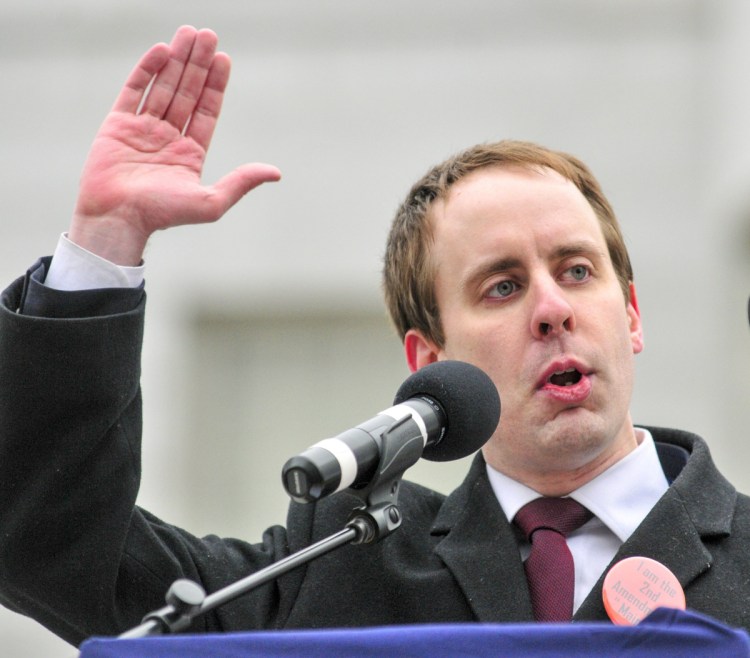AUBURN — Eric Brakey walked into Rolly’s Diner on Thursday and was immediately greeted by a supporter with a solemn look.
“I wish it was your name,” she said of the Election Day results.
Brakey, the Republican candidate for U.S. Senate, lost handily Tuesday to Sen. Angus King, on a night that conservatives in Maine would like to forget.
Brakey garnered 35 percent of the vote, with King’s total exceeding Brakey’s by more than 100,000.
Brakey reflected on his campaign Thursday – where he connected with voters and where he lost them – and even hinted at some regret over his campaign’s use of inflammatory anti-immigrant rhetoric in the run-up to the election.
While still a bit “shocked” by the final election tally, he said he had spoken to King about where the two shared common ground during the contentious race, and hoped a split government at the federal level can lead to compromise.
As for the future, Brakey said he has no plans – not even a job – as his second term in the state Senate comes to an end this year.
“You want to put all your energy into plan A,” he said. “I’m sure I’m going to stay involved in politics in some way. I’m not quite sure how.”
He said he might return to political activism or eventually find work within the Maine Republican Party. He is also not ruling out running for office again.
Brakey, who has historically identified as libertarian, directed the 2012 Ron Paul presidential campaign in Maine, and went on to create the libertarian Defense of Liberty PAC with David Boyer, his campaign manager.
Adding to the disappointment of Tuesday night was the loss of his Senate District 20 to the other party – Ellie Espling was defeated by Democrat Ned Claxton.
Brakey said his independent streak was popular with voters in District 20. Asked whether his campaign for U.S. Senate was forced to the right by King’s status as an independent, he said his campaign “openly” talked about ending the war in Afghanistan and cannabis policy.
“I was hoping to be the voice that made the Republican party more of the liberty-minded party that I know it can be,” he said. “We need to figure out what conservatives need to do in Maine to remain relevant after that slaughter that we just saw.”
In his concession statement and again Thursday, Brakey spent considerable time talking about his issues with the news media.
The news media only covers controversy, which forces political candidates to “find more controversial ways to make the same points you’d otherwise be making,” just to get the media to pay attention.
“People complain about Trump and his rhetoric, but the national media has created that environment where that’s how you succeed now,” he said.
He said his campaign may have spent too much time and focus on doing just that on the issue of immigration.
During the tail end of the Senate race, Brakey’s campaign at times mirrored President Donald Trump’s brand of Republican politics, linking immigration with crime.
Brakey campaign ads accusing King of wanting to “import” immigrants to repopulate Maine used photos of the Central American migrant caravan that Trump focused his attention on prior to the midterms.
The campaign also shared false or misleading statements about immigration, including a tweet that claimed 100 Islamic State fighters were among the migrants, which is not true.
When asked about that part of his campaign, Brakey said that in the media landscape where controversy sells, “it’s easy to get sucked into that, and at times I think in our campaign I found myself a little too close to the other side of the line than I was comfortable with. But, we do need to have a conversation about how we secure our borders, and how we reform our immigration system.”
Brakey said he and his staff were seeing internal polls showing a “late surge” by his campaign but did not anticipate the wave of progressive voters.
“The Maine voters have spoken, and that counts for something,” he said. “What was it that the Maine people were rejecting this time?”
He hopes Gov.-elect Janet Mills and the new Democratic Legislature can help “break the cycle” of political polarization. Because of Brakey’s libertarian background, he is quick to point out his pro-cannabis and pro-LGBTQ rights stances, where he finds himself more aligned with Democrats.
On social media Wednesday, Brakey wrote he had spoken with King about his view on federal cannabis policy, and “asked him to co-sponsor the States Act to have Washington, D.C., recognize and respect state decisions on cannabis policy.”
Brakey said even though he did not win, he believes his campaign forced King to shift his stances on a few issues, including cannabis.
“With Democrats in control, I’d love to see us get something done on criminal justice reform and drug policy reform over the next two years,” Brakey said.
King, who served as Maine’s governor from 1995 through 2003, is an independent but caucuses and regularly votes with Democrats in Congress.
Following breakfast Thursday, the entire Brakey campaign had planned a hike in hopes of unwinding from the long campaign. Brakey, 30, had surrounded himself with young, often first-time campaign workers.
“Unlike a lot of (campaign) teams, we had a lot of new people,” he said. “People who I think are going to be the future of politics in this state for a long time to come.”
arice@sunjournal.com
Send questions/comments to the editors.


